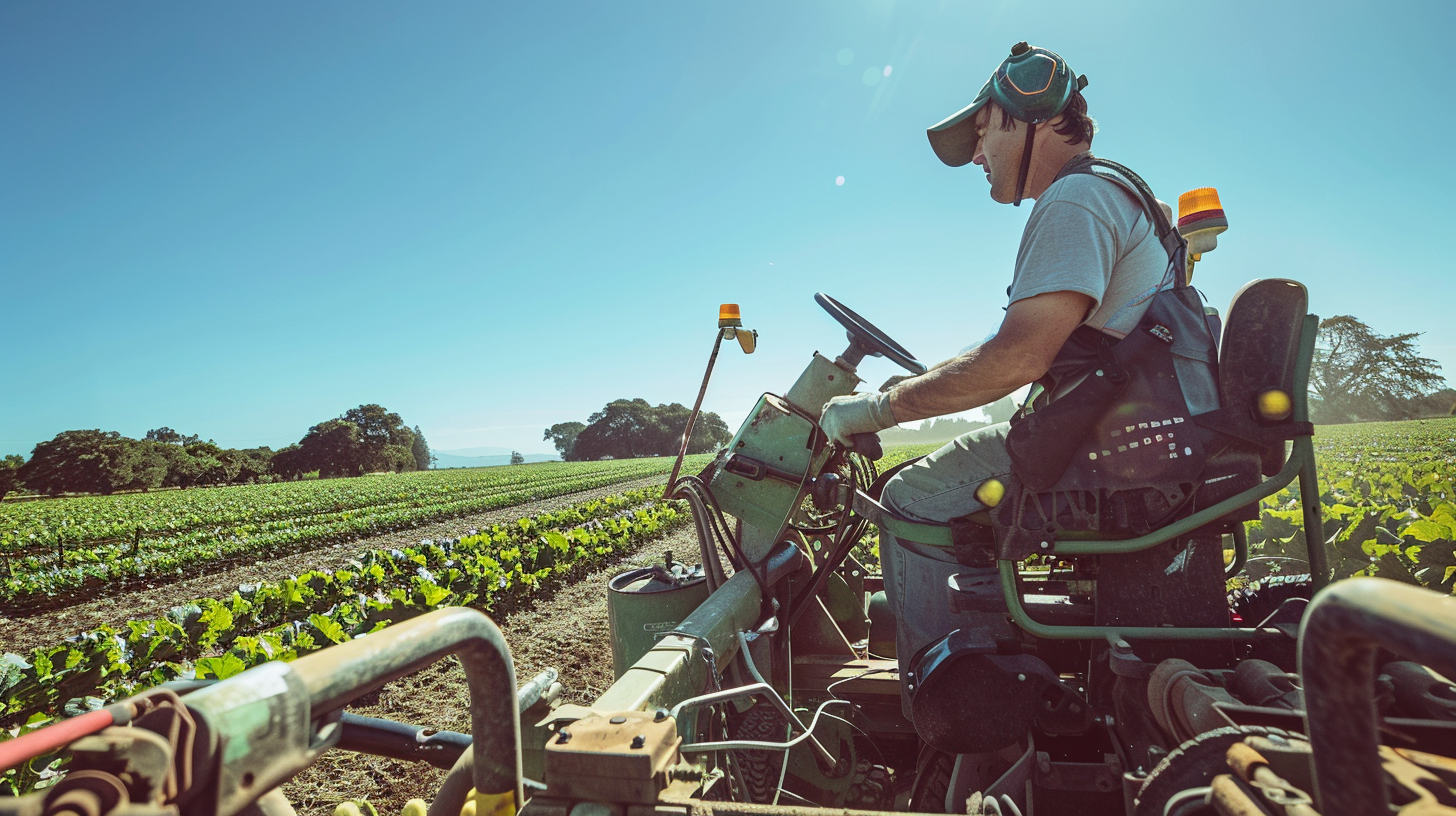Farm workers play a crucial role in Northern California's agricultural industry, yet their entitlement to workers' compensation often raises questions. Are they covered under the same protections as other workers? Understanding the specific laws and regulations that apply to farm workers is essential, especially given the unique challenges they face in their line of work. This article aims to shed light on these issues, offering valuable insights into the rights and protections available to farm workers in Northern California.
Navigating the complexities of workers' compensation can be daunting, particularly for those unfamiliar with the legal landscape. What are the mandatory coverage requirements for farm workers in California? How do exemptions and exceptions impact their claims? By exploring these questions and more, we aim to provide a comprehensive guide that informs and empowers farm workers to understand and assert their rights. With the support of Pacific Workers', navigating these claims can become a more manageable and less stressful process.
State-Specific Laws
California's Workers' Compensation Requirements
California stands out in the United States for its comprehensive workers' compensation laws, particularly in the agricultural sector. The state mandates that all employers, regardless of the industry, provide workers' compensation insurance to their employees. This includes farm workers, who are often at higher risk due to the nature of their work. California's Labor Code Section 3700 explicitly requires employers to secure workers' compensation insurance or obtain a certificate of self-insurance from the Department of Industrial Relations.
Mandatory Coverage for Farm Workers
In California, farm workers are entitled to the same workers' compensation benefits as employees in other industries. This mandatory coverage ensures that farm workers can receive medical care, compensation for lost wages, and rehabilitation services if they suffer a work-related injury or illness. The state's proactive stance on this issue reflects its recognition of the inherent risks in agricultural work, such as exposure to heavy machinery, pesticides, and physically demanding tasks.
Specific Provisions for Agricultural Employees
California's workers' compensation laws include specific provisions tailored to the needs of agricultural employees. For instance, the state has established safety regulations that employers must follow to minimize the risk of injuries. These regulations cover a wide range of areas, including the safe operation of machinery, proper handling of chemicals, and the provision of adequate training and protective equipment. Additionally, California offers special programs to support injured farm workers, such as vocational rehabilitation services to help them return to work.
Exemptions and Exceptions
Small Farms and Family-Only Operations
Criteria for Exemptions
In many states, small farms and family-only operations are exempt from providing workers' compensation coverage. The criteria for these exemptions typically include the size of the farm, the number of employees, and the nature of the employment relationship. For example, a small family-owned farm that employs only family members may not be required to carry workers' compensation insurance. This exemption is often justified on the grounds that family members are less likely to sue each other and that the financial burden of insurance could be too great for small operations.
Implications for Workers
While these exemptions may ease the financial burden on small farms, they can have significant implications for workers. Farm workers employed by small or family-only operations may find themselves without access to workers' compensation benefits if they are injured on the job. This lack of coverage can lead to financial instability, as injured workers may have to bear the cost of medical treatment and lost wages themselves. It also highlights the need for alternative safety nets or insurance options for workers in these settings.
Seasonal and Migrant Workers
Different Rules and Exemptions
Seasonal and migrant farm workers often face different rules and exemptions when it comes to workers' compensation coverage. In some states, these workers may be excluded from mandatory coverage due to the temporary and transient nature of their employment. This exclusion can leave a significant portion of the agricultural workforce without the protections afforded to other workers. The lack of coverage is particularly concerning given the high-risk nature of seasonal and migrant farm work, which often involves long hours, strenuous labor, and exposure to hazardous conditions.
Challenges Faced by Migrant Workers
Migrant workers face unique challenges in accessing workers' compensation benefits. Language barriers, lack of familiarity with the legal system, and fear of retaliation can all hinder their ability to file claims and receive the benefits they are entitled to. Additionally, the transient nature of their work means that they may move on to a different location before their claim is processed, complicating the process further. Advocacy groups and legal assistance organizations play a crucial role in helping migrant workers navigate these challenges and assert their rights.
Types of Coverage and Benefits
Medical Expenses
Coverage for Treatment and Rehabilitation
Workers' compensation insurance typically covers all medical expenses related to a work-related injury or illness. This includes the cost of emergency treatment, hospital stays, surgeries, medications, and ongoing rehabilitation. For farm workers, who are at high risk of injuries from machinery, falls, and exposure to chemicals, this coverage is essential. It ensures that they can receive the necessary medical care without incurring significant out-of-pocket expenses.
Nuances in Claiming Medical Benefits
While the coverage for medical expenses is comprehensive, there are nuances in claiming these benefits. Workers must follow specific procedures, such as reporting the injury promptly and seeking treatment from approved healthcare providers. Failure to adhere to these procedures can result in delays or denials of benefits. Additionally, disputes may arise over the extent of the injury and the necessity of certain treatments, requiring legal intervention to resolve.
Lost Wages
Calculating Compensation for Lost Income
Workers' compensation also provides benefits for lost wages if an injury or illness prevents a worker from returning to their job. The amount of compensation is typically calculated based on a percentage of the worker's average weekly wage. In California, for example, injured workers can receive temporary disability benefits amounting to two-thirds of their average weekly wage, up to a maximum limit set by the state. This compensation helps to alleviate the financial burden on workers who are unable to earn their regular income due to a work-related injury.
Temporary vs. Permanent Disability Benefits
There are different types of disability benefits available under workers' compensation. Temporary disability benefits are provided to workers who are temporarily unable to work due to their injury. These benefits continue until the worker is able to return to work or reaches maximum medical improvement. Permanent disability benefits, on the other hand, are provided to workers who suffer a permanent impairment that affects their ability to work. The amount and duration of these benefits depend on the severity of the impairment and the worker's ability to perform their job.
Rehabilitation Services
Access to Physical and Vocational Rehabilitation
Rehabilitation services are a critical component of workers' compensation benefits. These services include physical therapy to help injured workers recover and regain their physical abilities, as well as vocational rehabilitation to assist them in returning to work. For farm workers, who often perform physically demanding tasks, access to rehabilitation services is essential for a full recovery. Vocational rehabilitation may also include job retraining programs to help workers transition to new roles if they are unable to return to their previous job.
Long-Term Support for Injured Workers
Long-term support is crucial for workers who suffer severe or permanent injuries. Workers' compensation programs may provide ongoing medical care, disability benefits, and vocational support to help these workers maintain their quality of life. In some cases, injured workers may also be eligible for additional benefits, such as home modifications or assistive devices, to accommodate their needs. Ensuring that farm workers have access to these long-term support services is vital for their well-being and financial stability.
Role of International Labour Organization (ILO)
Advocacy for Agricultural Workers
The International Labour Organization (ILO) plays a significant role in advocating for the rights and protections of agricultural workers. The ILO sets international labor standards and promotes policies that ensure fair treatment and safe working conditions for all workers. Its conventions and recommendations provide a framework for countries to develop and implement effective workers' compensation systems that include agricultural workers.
Implementation Challenges in Different Countries
While the ILO's advocacy is crucial, implementing its standards can be challenging in different countries. Factors such as economic conditions, political will, and existing legal frameworks can influence the extent to which countries adopt and enforce these standards. In some cases, there may be resistance from employers or insufficient resources to support comprehensive workers' compensation programs. Addressing these challenges requires a concerted effort from governments, employers, and worker advocacy groups to create a more inclusive and protective environment for agricultural workers.
The Role of Workers' Compensation in Napa Valley and Other U.S. Wine Regions
Importance of Workers' Compensation in Wine Regions
The vineyards and wineries of Napa Valley, Sonoma County, and other prominent wine regions across the United States rely heavily on farm workers to cultivate and harvest grapes. These regions are not only known for their exquisite wines but also for the labor-intensive processes that go into maintaining their vineyards. Ensuring that farm workers in these areas are covered by workers' compensation is crucial for several reasons:
- High-Risk Work Environment: Vineyard work often involves using heavy machinery, handling hazardous chemicals, and performing physically demanding tasks, increasing the risk of injuries and illnesses.
- Economic Stability: Workers' compensation helps provide financial stability for injured workers, ensuring they can access medical care and receive compensation for lost wages.
- Legal Compliance: Adhering to state-specific workers' compensation laws helps wineries and vineyards avoid legal disputes and penalties, fostering a more ethical and compliant work environment.
Challenges and Solutions in Wine Regions
Despite the importance of workers' compensation, farm workers in wine regions face several challenges:
- Seasonal Employment: Many vineyard workers are employed seasonally, which can complicate their eligibility for workers' compensation benefits. Ensuring these workers are aware of their rights and the specific coverage available to them is essential.
- Migrant Labor: A significant portion of vineyard workers are migrants, who may face language barriers and lack of knowledge about their legal rights. Providing resources in multiple languages and partnering with advocacy groups can help bridge this gap.
Efforts to address these challenges include:
- Education and Outreach: Conducting workshops and informational sessions to educate workers about their rights and the workers' compensation process.
- Legal Support: Offering legal assistance to help workers navigate claims and resolve disputes.
- Policy Advocacy: Working with policymakers to ensure that workers' compensation laws adequately protect seasonal and migrant workers in the agricultural sector.
Wrapping Up: Understanding Workers' Compensation for Farm Workers in Northern California
Farm workers in Northern California are entitled to robust workers' compensation protections, reflecting the state's commitment to safeguarding those in high-risk agricultural roles. California mandates comprehensive coverage, ensuring farm workers receive medical care, wage compensation, and rehabilitation services. This stands in contrast to other states with exemptions and thresholds that leave many agricultural workers vulnerable. The variability in protections across the U.S. highlights the importance of understanding state-specific laws and the unique challenges faced by farm workers.
Navigating workers' compensation can be complex, especially for seasonal and migrant workers who often face additional barriers. California's proactive stance, coupled with specific provisions for agricultural employees, aims to address these challenges. However, disparities in coverage across states and the unique hurdles faced by small farms and migrant workers underscore the need for continued advocacy and reform. Ensuring equitable protections for all farm workers isn't just a legal necessity—it's a moral imperative.

